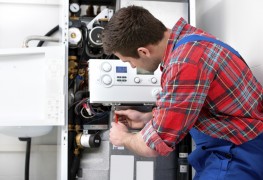Did a freezing cold shower just alert you to the fact that your water heater’s given up the ghost? You’ll have to replace it quickly, of course, but choosing the right model can be tricky when you look at the huge range of options available. To point you in the right direction, here are a few things to look for.
- Browse Categories
- All Tips
-
Home & Garden
- All
- Appliances
- Bathroom
- Cleaning
- Crafts
- Decorating
- Electrical
- Flooring
- Furniture
- Garage Door
- Gardening
- Green Living
- Heating
- Home Alarm Systems
- Home Maintenance
- Home Remedies
- Home Security
- Home Staging
- House Sitting
- Junk Removal
- Kitchen
- Lawn Care
- Lock Systems
- Moving
- Outdoor Living
- Pest Control
- Plumbing
- Renovation
- Roofing
- Snow Removal
- Storage
- Tools
- Tree Service
- Health
- Family
- Travel
- Auto
- More Tips

5 criteria your water heater must meet
October 16, 2014

1. Energy efficiency
These days, the most critical factor in learning how to choose a water heater is energy efficiency. Check each model’s energy factor (EF); the higher it is, the more energy-efficient the appliance. With an Energy Star water heater, the closer it is rated to one, the greater the energy savings it promises.
2. Energy source
Electric water heaters are economical to purchase. They’re easy to install, they heat the water fairly quickly and they require little maintenance. Although their EF rating is high, they consume more energy than gas water heaters.
- Natural gas water heaters cost more, but they are more energy efficient than electric models. However, installation is typically more complicated, especially if your old water heater was electric. You’ll need new gas lines and outdoor venting.
- Propane water heaters are as energy efficient as natural gas models. Choose this type if you want to reduce your energy consumption and your home isn’t connected to a natural gas distribution network.
- Oil water heaters are the fastest way to heat water, but the choice of models is limited. You also have to have an oil tank and arrange for regular deliveries of fuel.
3. Features
Water heaters with extra storage tanks provide a constant supply of hot water and are quite economical. Tankless water heaters, also known as on-demand models, are more expensive initially but give energy savings of around 30 per cent. On the other hand, they aren’t suitable if you often use the dishwasher and washing machine at the same time.
4. Size
Choosing the right size of water heater is an important consideration. If it’s too small, you may run out of hot water and it will wear out faster. If it’s too big, you’ll increase your energy bill unnecessarily.
- Water heaters with tanks. To determine the required storage capacity, you must first evaluate your water needs. That depends largely on the number of occupants bathing and using hot water in other ways. A supplier can recommend a capacity that matches your needs.
- Tankless water heaters. A water heater’s productivity is rated in gallons per minute. When determining the heating capacity you need, calculate the amount of water that could be required by each of your hot water appliances in a given time period.
5. Safety
Lastly, if you choose a fuel-powered water heater, make sure that it’s safely installed and that you have a carbon monoxide detector close by.






